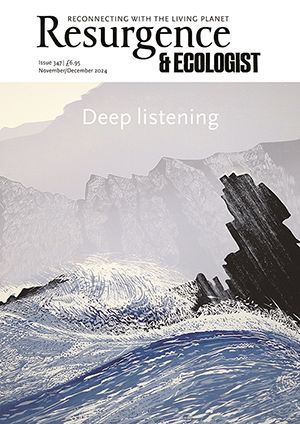Guy Shrubsole has long been concerned with who has ownership of Britain’s land. His 2019 book Who Owns England? was one of the first attempts to fully map the country’s owners since the Domesday Book, confirming that it is an appallingly tiny group of people. In The Lie of the Land, Shrubsole returns to lay Britain’s deteriorating ecological condition at their feet. “For centuries, landowners have claimed to be the trusted stewards of Britain’s landscapes… [These claims] increasingly ring hollow.” It’s a scorching explanation of how ecosystems are being brutalised by archaic structures of land and property management in Britain.
Shrubsole looks at all ends of this problem. He covers the leisure activities of ultra-wealthy, elite landowners, and how their pastimes like grouse and pheasant shooting cause major ecological destruction. He scrutinises the failures of landowners’ own ecological goals, including questioning how the Church of England can expect to meet its net zero targets when it isn’t tackling the greenhouse gases escaping mismanaged peat in its landholdings. And he re-examines the waves of land privatisation that have increasingly shut out public involvement in conservation, from enclosure to attempts to sell off state land, and the unfinished business of British national parks. It’s a litany of policy failures and warped priorities, replete with genuinely jaw-dropping examples of perverse incentives, bold claims and closed-door deals.
Shrubsole argues that, contrary to landowners’ claims, it is public access to land and community involvement in conservation that is key to protecting ecosystems. As a co-founder of Right to Roam, he is speaking from the heart when he argues that landowners “cast themselves as responsible stewards, a bulwark against rampaging hordes of townies with their litter and uncouth manners… [but recreational access is] very far down the rankings for things society is doing to screw up nature. Compared to moorland burning, fenland drainage, the release of invasive species, the agricultural pollution poured into rivers, or the mass graves of pheasants dumped by some shoots, going for a walk in the countryside isn’t exactly the most ecologically reckless activity.”
Indeed, Shrubsole is quick to remind us that communities are frequently ecosystems’ most ardent protectors and whistleblowers. He recounts the very long history of campaigns to protect ecosystems, and the extraordinary efforts of citizen scientists and activists who are testing polluted water, cleaning up litter, and writing their own countryside codes. Shrubsole is adamant that we are biophilic: “None of these activists own huge estates or great tracts of land, yet they care for land and water they do not own,” he says. It’s a convincing narrative.
I did want more from Shrubsole in some areas. There are vital questions to be had in terms of Britain’s influence internationally, whether there are ideas from pre- or a-colonial conceptions of property that we should be taking on in Britain – should and can anyone ‘own’ a forest? – and the racial and health justice angles to land access. Shrubsole is right to note that it is hypocrisy to smear environmental campaigners as middle-class busybodies when the object of their ire is the landowning elite. But equally it would be valuable to have more consideration of the factions within this campaigning space, the disagreements – HS2, anyone? – and opportunities to widen participation and ally with other struggles.
But this remains a book bristling with energy and ideas. Shrubsole clearly has the new administration in his sights – “Time and time again … the government in charge takes on board a few of the review’s recommendations, whilst ignoring the more radical proposals” – and provides detailed lists of policies and interim policies “until a government is brave enough” to pick up the core recommendations. And in the meantime, readers are offered a great list of important and brave campaigns to join for themselves.
The Lie of the Land: Who Really Cares for the Countryside? by Guy Shrubsole. William Collins, 2024. ISBN: 9780008651770






